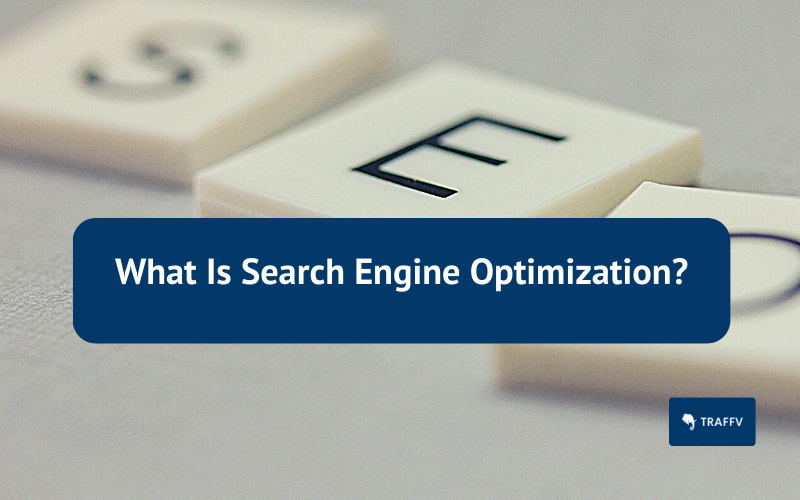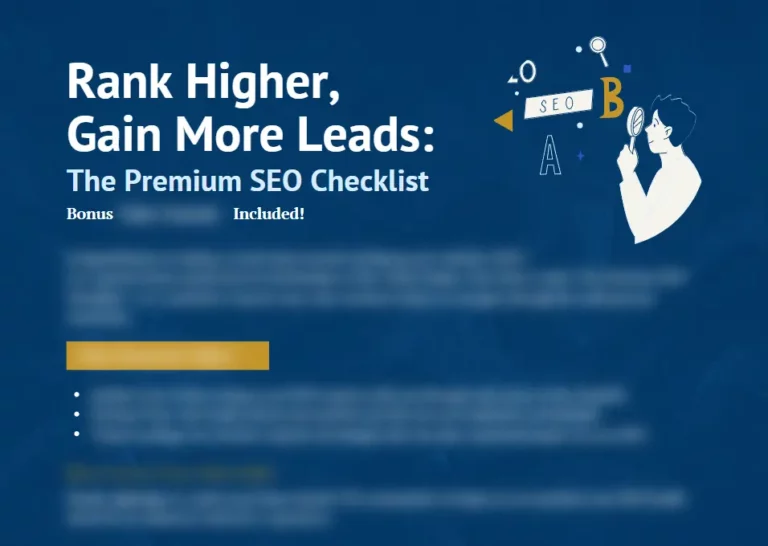SEO stands for Search Engine Optimization. It’s a set of tactics to optimize a website for search engines.
That way, a site can be seen in the organic search results when someone searches for something online.
It may sound like a complicated term with all the makings of being mysterious and overwhelming, but it’s not.
We’re in front of major search engines almost every single day.
Like, imagine when you want to…
- Book airline tickets to travel somewhere.
- Understand what that rash is on your body.
- Find the nearest restaurants, cafés, or bars.
- Check the cast of your favorite Netflix show.
Where do you go in those cases?
Probably Google.
That’s the one deciding which website should show up as the top result when you open your browser and type a query.
In a nutshell:
- What – SEO is a systematic process to increase a site’s search rankings.
- Why – You do SEO to get traffic from organic search results.
- How – By properly answering users’ questions.
In this post, we’ll break down why SEO is important, how it works, where to learn it, its pillars, and more.
Ready for the run-down on SEO basics? Let’s get started.
Why Is SEO Important?
The importance of SEO lies in whether or not you exist on the Internet. Just for reference, Google processes 8.5 billion searches per day.
The thing is: search engines can’t show everything but what the algorithm thinks is relevant.
So 95% of organic traffic goes to the first page, and 54.4% of clicks end up in the first three results.
This is why SEO is so valuable.
What Can SEO Do for Your Business?
It depends on the nature of the business (B2C or B2B? Global or local?).
Generally speaking, search engine optimization can increase organic visibility, leading to more traffic, more clicks, more leads, AND more conversions.
Those come in a variety of forms. Think of product sales, service bookings, email signups, phone calls, ad views, and the list goes on and on.
When it comes to SEO benefits, this is what it does:
- Drives quality organic search traffic → not random visitors but related to your niche.
- Increases ROI (return on investment) → on average by ~200%.
- Enhances the site experience and usability → to make user navigation easier.
- Gives audience insights → for a better understanding of the customer.
- Builds trust and credibility over time → because authority also wins.
- Creates awareness around your brand → noticeable before and after.
- Saves money on PPC expenses → so you don’t rely solely on advertising.
- Complements other marketing initiatives → like email, social media, and PR.
If you have a business in Singapore and feel lost about SEO (search engine optimization), check out our SEO services, and we will help you identify your site’s strengths and weaknesses.
Learning SEO – Roadmap Overview
To learn SEO, you must go through the right resources on fundamentals, execution, implementation, and tools. Once you’re done with that, what’s next is the hands-on experience with a website—where you play around, experiment, and see what works.
The good news: you don’t have to do research from scratch. Here is a curated directory with the crème de la crème of free content to learn SEO.
| HOW TO LEARN SEO (POWERED BY LEARNINGSEO.IO) | |
SEO Fundamentals | • Introduction to SEO • Keyword Research • Competition Analysis • Content Optimization • Technical Optimization • Link Building |
Execute an SEO Process | • Developing an SEO Audit • Establishing an SEO Strategy • Setting SEO Goals • Measuring SEO • Reporting SEO • SEO Process Management |
Implement SEO In CMS | • WordPress SEO Guidelines • Wix SEO Guidelines • Shopify SEO Guidelines • Magento SEO Guidelines • Squarespace SEO Guidelines • Webflow SEO Guidelines |
Deepen SEO Knowledge | • Technical • Content • Backlinks • Management • Opportunities • Scenarios |
Free SEO Tools | • Keyword Research Tools • On-Page SEO Tools • Link Building Tools • Monitoring Tracking Tools • SEO Dashboards Tools • Web Speed Optimization Tools |
What else can you do to make some progress on your learning curve?
Specialize within SEO, for example, on Local SEO, Ecommerce SEO, or International SEO – just to name a few.
And of course, never stop learning. Following reliable SEO news (publications, newsletters, podcasts, events…), it’s a great way to stay up-to-date with the latest trends and changes.
If you’re more like a visual person and having 27 tabs open isn’t your thing, we uploaded a FREE Singapore SEO Course. Watch it now or save it for later. You’re welcome.

How Does SEO Work Exactly?
Search engines work with an algorithm.
This type of algorithm runs a three-stage process – crawling, indexing, and ranking – to understand your site and determine if it’s relevant enough to show up in the SERPs (search engine results pages). So SEO works by doing content and technical tasks on and off your site to optimize that process and get organic traffic.
Let’s take a closer look at it. Shall we?
Side note: From now on, we’ll focus on the Google search engine.
Crawling
In the crawling stage, Google uses a piece of software called crawlers (a.k.a. spiders or bots) to scan the web for new and updated pages by following links and reading sitemaps. Crawlers collect data about the content of each web page. And then comes the indexing phase.
Indexing
At this point, data has been gathered from crawling. Next, it’s the search engines’ turn to analyze the content and metadata to understand what your page(s) is about AND store all that information in a super big database—the Google Index.
Keep in mind that search engine algorithms won’t always index every page on your website. It happens, and it’s normal.
Ranking
The finish line. This is the desired outcome of the crawling-indexing situation. If the algorithm thinks any of your web pages are valuable for a search, you win. Google will show your site.
What Are The 3 Pillars of SEO?
The 3 pillars of SEO are On-Page SEO (within a website), Off-Page SEO (outside a website), and Technical SEO (self-explanatory). All three are the foundation of SEO.
On-Page SEO
On-Page SEO is what you do ON your site to optimize it for search engines. You have 100% control over it. It’s the most accessible pillar to manage and understand.
Search engines consider the following on-page SEO elements to deliver search results:
- Site Content – most of it is a mix of effective copywriting and content writing.
- Keywords – to match informational, navigational, commercial, or transactional intents.
- Title Tags – the first thing people see when they come across your site on the SERPs.
- External Linking – to point out valuable resources outside of your site.
- URL Structure – short, descriptive, and with the target keyword.
- Images – with keyword-rich alt-text and filenames in a lightweight format.
- Meta Descriptions – brief summaries describing what to expect from a web page.
- Headers – H1, H2, H3, etc… that hierarchically structure the content.
The more aligned these elements are with the user’s search intent, the higher the chances of ranking. Does this mean you just have to please search engines?
Nope. In fact, Google released the Helpful Content Update to promote more original/relevant search results. So adopting SEO best practices is smart, but focusing on people-first content is the way to go.
For example, Awfully Chocolate. It’s a Singaporean bakery chain that sells cakes online.
The website has ~67,500 visits per month and ranks for a couple of non-branded relevant keywords. Like [chocolate cake] and [cake chocolate].
We could manually check on-page SEO attributes, but instead, we can use any SEO extension to take a look around and get some insights.
As you can see, the title tag and meta description target the main keyword.
On the home page, there’s the primary keyword in H1 and a plural variation in H2 – which are the strongest headings in terms of information architecture and hierarchy.
Then, notice that the URLs have the keyword integrated for the different chocolate cakes.
Last but not least, images also have alt-text and a filename containing the keyword.
As with everything in the search engine marketing space, on-page SEO is an ongoing process. Ideally, you want to regularly monitor and adjust your strategy. For old and new pages alike. With a proper approach, on-page SEO can produce juicy organic traffic.
Off-Page SEO
On the other side, off-page SEO is what you do OFF your site to optimize it for search engines. You have partial control over it because it’s influenced through external channels. Social media marketing and local SEO efforts can be manageable.
But links from niche websites or media outlets? That’s another story. It takes time, energy, or money.
Search engines factor take into account these off-page factors:
- Link Building – for the so-called backlinks (links from other websites pointing to yours).
- Content Marketing – High-quality content paired with distribution earns backlinks.
- Local SEO – being known in your city, state, country, or region counts for Google.
- Social Media – push social signals that contribute to the brand’s visibility online.
- Influencer Outreach – to leverage relationships with industry content creators.
- Guest Posting – for access to new audiences and position yourself as an expert.
- Brand Mentions – even without links, brand awareness is always welcome.
Let’s use the content marketing factor for illustrative purposes.
It has hybrid features that make it work for both on-page and off-page SEO.
On-page because, depending on the medium (blog posts, case studies, reports), it happens within your site. When you create a content funnel optimized for E-A-T (Expertise, Authoritativeness, Trustworthiness), creators cite you as a reliable source—leading to earning backlinks.
Like this article by Ahrefs on examples of marketing objectives…
On-page technique, off-page result. Pretty cool, huh?
And content marketing is also off-page because
A) it’s still content
B) it happens outside your website through guest posting, social media, news/magazines, podcasts, and so on.
Here’s an example of a contributing writer who works for a video editor software company called Movavi. She made a guest post about the [Best Video Editor Tips for Beginners].
Where?
On a tech publication. Of course, there’s a link redirecting to the video editing app.
Off-page technique, off-page result.
Technical SEO
And finally, this is what you do behind the scenes with the technical aspects of your website to optimize the way search engines crawl and index that site. It requires technical know-how. Not all of the tasks, but some of them. The most complex ones, actually.
Search engines robots scan these technical SEO attributes:
- Robots.txt – to tell search engines which pages to crawl and which to ignore.
- Navigation – clear and intuitive links and menus to move around the website.
- XML Sitemap – the relationship between one page and another has to make sense.
- Internal Linking – links pointing to other web pages on the same site to give context.
- Schema Markup – structured data to expand on what your site content is about.
- Page Experience – core web vitals, HTTPS, and mobile friendliness. All-in-one.
To give you an idea of a common technical SEO task, imagine you’re working with a store that sells shoes online. One of the things you’ll do is optimize the website’s page load speed.
Start by analyzing the current load time using a tool like Google PageSpeed Insights. Once you get the report from the tool, you’ll have a picture of areas where the site is slow, potential reasons (such as large image files or bloated code), and steps to do something about it.
Based on your analysis, you might recommend:
- Compressing collection/product images to reduce their file size.
- Minimizing CSS and JavaScript files to make them lighter and speed up page load time.
- Enabling browser caching to store frequently used files and reduce server requests.
- Hiring a content delivery network (CDN) to distribute content around the world faster.
- Upgrading web hosting plan to optimize your server response time.
Implementing this set of actions will help with the site loading speed, which can positively impact the page experience and, therefore, search engine rankings.
Will SEO Ever Die?
Search Engine Optimization (SEO) won’t ever die as long as people continue using the Internet to find information.
The global SEO market is expected to reach $99.4B by 2027, according to a report by Research and Markets. Strategies, trends, and algorithms will evolve over time, for sure. But there’s no indication that SEO will be going away any time soon.




